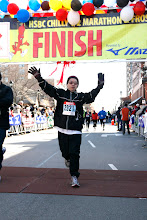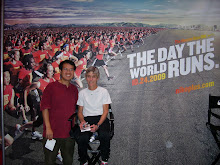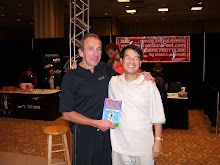Found on the www.runningmania.com forum. Very interesting study!
Marathon heart attacks: new data
January 13th, 2012
There’s a big new study out in the New England Journal of Medicine that takes a comprehensive look at every case of cardiac arrest during every marathon or half-marathon in the U.S. with more than 100 participants between 2000 and 2010. It’s being widely covered in the press; you can read a good summary in the New York Times or in the Globe and Mail, among other places. The primary message: these events are rare. There 59 cases of cardiac arrest, of which 42 were fatal. That translates to a 1 in 259,000 chance of dying, which is much lower than previous reports and than many other sports.
I’m actually in Houston right now for the U.S. Olympic Marathon Trials, and it happens that Aaron Baggish of Mass General, the senior author of the study, was giving a talk this morning to the members of the World Road Race Medical Society — so I popped in to hear what he had to say. A couple points he made that I found interesting:
Weather wasn’t a factor. The average starting temperature during events where someone suffered a heart attack was almost identical to the 10-year average (55.9 vs. 55.5 F), and the average deviation was just 0.3 degrees.
For 31 of the cases, they were able to track down either the survivor or the next-of-kin and get full medical records, autopsy results, and running history — so this allowed them to really look at the causes of death in detail. One of the surprises is that none of the runners died from a ruptured plaque producing a blood clot, which is (or at least was) thought to be one of the possible mechanisms of sudden death in athletes. The problem with ruptured plaques is that they’re hard to predict in advance. But if underlying coronary artery disease is the real problem (more on that in a sec), then pre-exercise cardiac screening should be able to pick some of that up, Baggish argues.
The average age of the people who survived cardiac events was 53; the average age of the people who died was 34. There are two distinct groups here. One is young people with thick hearts (“hypertrophic cardiomyopathy”), an underlying genetic conditionl; when they collapse, they’re very hard to revive and tend to die. The other is older men with narrowed arteries (coronary artery disease) due to the usual risk factors; when they collapse, they can often be revived if someone gets to them soon enough.
That brings me to one of Baggish’s key point: the absolute best predictor of whether someone would survive cardiac arrest during a race was simple: did a bystander start CPR immediately, before paramedics got there? The lesson is simple: we should all — runners, family members, spectators, heck, everyone in society — have basic CPR training. It could make all the difference to someone, including you.
Baggish’s overall message: running (and by extension, other aerobic activity) is generally safe — but it doesn’t give you immunity from heart disease. That means that everyone, and particularly older males, should be alert for warning signs and not ignore them. Some key ones:
•a burning sensation in the chest (could be confused with acid reflux) that comes on when you start running then gradually fades away, and keeps recurring;
•breathing more heavily than you’d expect given your effort;
•persistent, unusual fatigue.
None of these risk factors necessarily mean something is wrong, but they can be a signal that it’s worth checking in with your doctor to see is you’ve got coronary artery disease that needs to be addressed before racing a marathon.
Last point. Previous studies have shown that most marathon race deaths occur in the final mile or at the finish; this study confirms that. The implication: if you have reason to worry about your heart’s health and want to minimize that risk, think twice about your final sprint.
Saturday, January 14, 2012
Subscribe to:
Post Comments (Atom)






























No comments:
Post a Comment